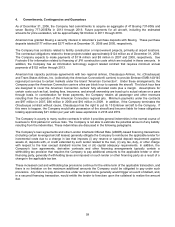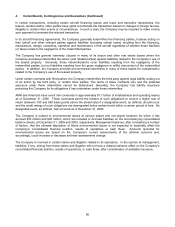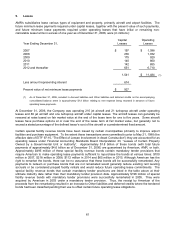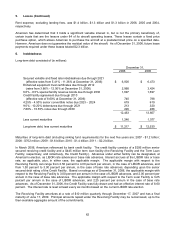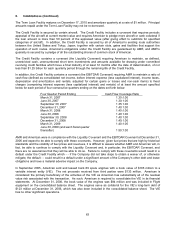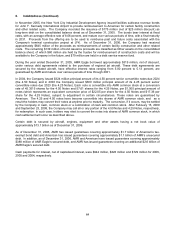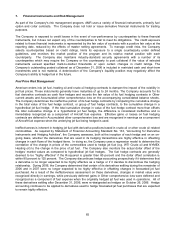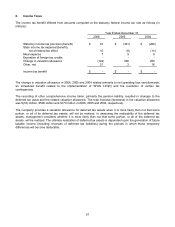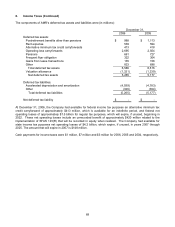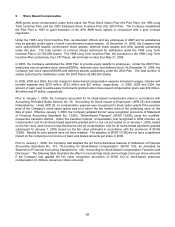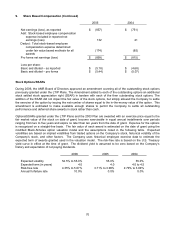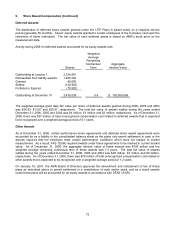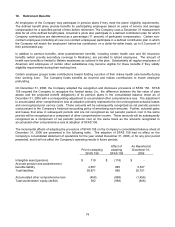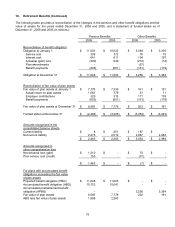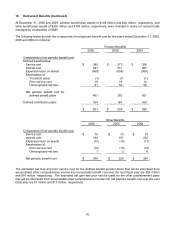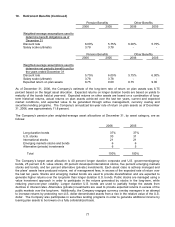American Airlines 2006 Annual Report Download - page 73
Download and view the complete annual report
Please find page 73 of the 2006 American Airlines annual report below. You can navigate through the pages in the report by either clicking on the pages listed below, or by using the keyword search tool below to find specific information within the annual report.69
9. Share Based Compensation
AMR grants stock compensation under three plans: the Pilots Stock Option Plan (the Pilot Plan), the 1998 Long
Term Incentive Plan, and the 2003 Employee Stock Incentive Plan (the 2003 Plan). The Company established
the Pilot Plan in 1997 to grant members of the APA AMR stock options in conjunction with a prior contract
negotiation.
Under the 1998 Long Term Incentive Plan, as amended, officers and key employees of AMR and its subsidiaries
may be granted certain types of stock or performance based awards. At December 31, 2006, the Company had
stock option/SSAR awards, performance share awards, deferred share awards and other awards outstanding
under this plan. The total number of common shares authorized for distribution under the 1998 Long Term
Incentive Plan is 23,700,000 shares. The 1998 Long Term Incentive Plan, the successor to the 1988 Long Term
Incentive Plan (collectively, the LTIP Plans), will terminate no later than May 21, 2008.
In 2003, the Company established the 2003 Plan to provide equity awards to employees. Under the 2003 Plan,
employees may be granted stock options/SSARs, restricted stock and deferred stock. At December 31, 2006, the
Company had stock options/SSARs and deferred awards outstanding under the 2003 Plan. The total number of
shares authorized for distribution under the 2003 Plan is 42,680,000 shares.
In 2006, 2005 and 2004, the total charge for share-based compensation expense included in wages, salaries and
benefits expense was $219 million, $132 million and $21 million, respectively. In 2006, 2005 and 2004, the
amount of cash used to settle equity instruments granted under share-based compensation plans was $29 million,
$6 million and $7 million, respectively.
Prior to January 1, 2006, the Company accounted for its share-based compensation plans in accordance with
Accounting Principles Board Opinion No. 25, “Accounting for Stock Issued to Employees” (APB 25) and related
Interpretations. Under APB 25, no compensation expense was recognized for stock option grants if the exercise
price of the Company’s stock option grants was at or above the fair market value of the underlying stock on the
date of grant. Effective January 1, 2006, the Company adopted the fair value recognition provisions of Statement
of Financial Accounting Standards No. 123(R), “Share-Based Payment” (SFAS 123(R)) using the modified-
prospective transition method. Under this transition method, compensation cost recognized in 2006 includes: (a)
compensation cost for all share-based payments granted prior to, but not yet vested as of January 1, 2006, based
on the fair value used for pro forma disclosures and (b) compensation cost for all share-based payments granted
subsequent to January 1, 2006, based on the fair value estimated in accordance with the provisions of SFAS
123(R). Results for prior periods have not been restated. The adoption of SFAS 123(R) did not have a significant
impact on the Company’s net income or basic and diluted amounts per share in 2006.
Prior to January 1, 2006, the Company had adopted the pro forma disclosure features of Statement of Financial
Accounting Standards No. 123, “Accounting for Stock-Based Compensation” (SFAS 123), as amended by
Statement of Financial Accounting Standards No. 148, “Accounting for Stock-Based Compensation-Transition and
Disclosure.” The following table illustrates the effect on net earnings (loss) and earnings (loss) per share amounts
if the Company had applied the fair value recognition provisions of SFAS 123 to stock-based employee
compensation (in millions, except per share amounts):


